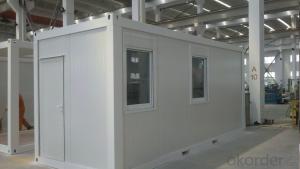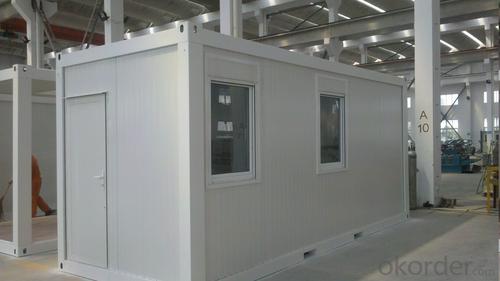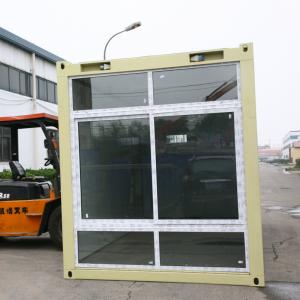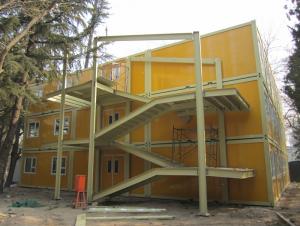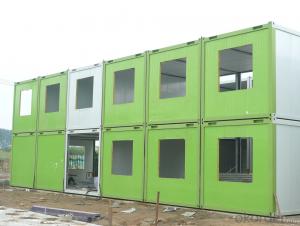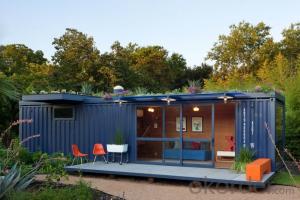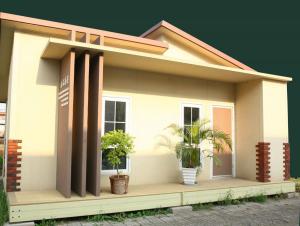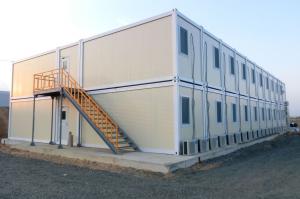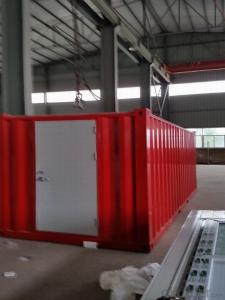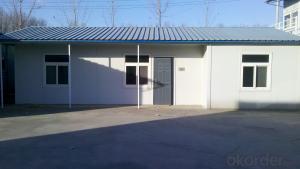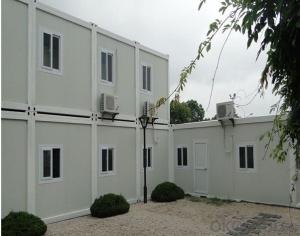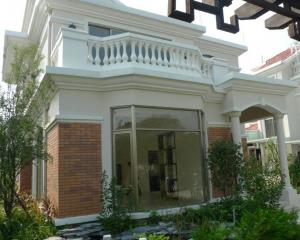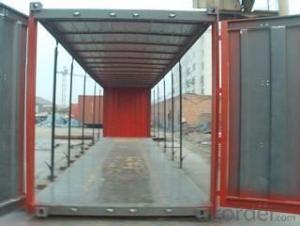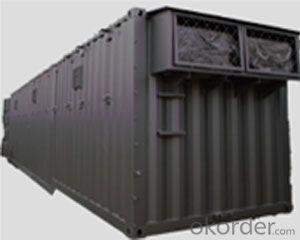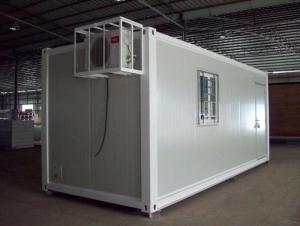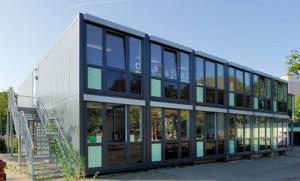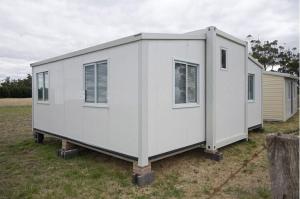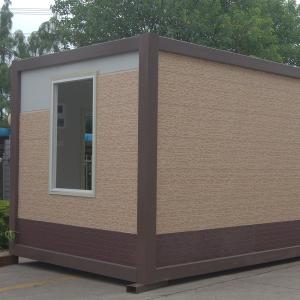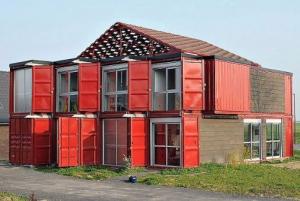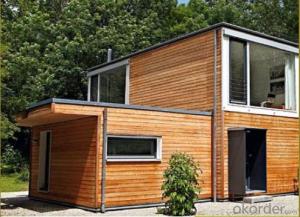High Quality Prefabricated Container House
- Loading Port:
- Tianjin
- Payment Terms:
- TT OR LC
- Min Order Qty:
- -
- Supply Capability:
- 20000 Set set/month
OKorder Service Pledge
OKorder Financial Service
You Might Also Like
20 Feet High Quality Prefabricated Container House
1.Advantages of flatpack container house Features:
Efficient transportation
Fast construction
Flexible combination
Cost saving
Green & Sustainability
2. General information:
| Item | Description |
| Name | prefab shipping container homes |
| Structure |
|
| Wall Panel |
|
| Insulation |
|
| Electrical |
|
| Door |
|
| Window |
|
| | |
- Q: Are container houses suitable for areas with limited access to transportation?
- Yes, container houses are suitable for areas with limited access to transportation. Container houses can be easily transported and assembled in remote locations, avoiding the need for extensive transportation infrastructure. Additionally, the compact and modular nature of container houses makes them adaptable to various terrains and can be easily transported by trucks, ships, or even helicopters if necessary.
- Q: Are container houses safe to live in?
- Yes, container houses are safe to live in. They are designed to meet structural and safety standards, and with proper insulation, ventilation, and utilities installation, they can provide a comfortable and secure living environment.
- Q: Can container houses be designed to have open floor plans?
- Certainly, open floor plans can indeed be incorporated into the design of container houses. The modular nature of these houses allows for flexibility in layout and design, thereby enabling the creation of spacious and open living areas. By strategically placing and removing interior walls, container houses can be customized to have open floor plans that optimize space and establish a seamless flow between different areas like the living room, kitchen, and dining area. Moreover, the design can incorporate large windows and glass doors to invite abundant natural light, thus further enhancing the sense of openness and airiness within the space. Container houses provide limitless possibilities for open floor plans, which is why they are highly favored by individuals who appreciate a contemporary and uncluttered living environment.
- Q: Can container houses be designed with a garage?
- Yes, container houses can be designed with a garage. Container houses are versatile and can be customized to meet individual needs and preferences. By strategically planning the layout and design, it is possible to incorporate a garage space within a container house. This can be achieved by either extending the container structure to accommodate the garage or by creating a separate container module specifically for the garage. The size and design of the garage can be tailored to fit the available space and intended use, whether it's for parking vehicles, storage, or a workshop. With proper planning and design, container houses can definitely be equipped with a functional garage.
- Q: Are container houses suitable for multi-family living?
- Multi-family living can be accommodated by container houses. These houses are constructed using repurposed shipping containers, typically made of durable materials like steel. They can be easily modified and stacked to create multi-level structures, making them ideal for multiple families in one building. There are several advantages to living in container houses for multi-family arrangements. Firstly, they are cost-effective compared to traditional construction methods. The use of shipping containers significantly reduces construction costs, making housing more affordable for families. Additionally, container houses can be built quickly, resulting in shorter project timelines and faster occupancy. Container houses also offer flexibility in terms of design and layout. The modular nature of shipping containers allows for easy customization to meet the specific needs of each family. Multiple containers can be combined to create larger living spaces, while separate containers can provide privacy and personal space for each family. In addition, container houses are eco-friendly. By repurposing shipping containers, the demand for new construction materials is reduced, minimizing the environmental impact. They can also be designed to be energy-efficient by incorporating insulation, solar panels, and other sustainable features, resulting in lower energy consumption and utility costs for multi-family living. However, it is important to consider some potential drawbacks of container houses for multi-family living. The limited space within individual containers may require careful planning to ensure adequate living areas for each family. Noise insulation could also be a concern, as steel containers may transmit sound more easily than traditional materials. Proper insulation and soundproofing measures should be incorporated to address this issue. In conclusion, container houses can be a suitable option for multi-family living due to their affordability, design flexibility, and eco-friendly nature. While there may be challenges to overcome, with proper planning and customization, container houses can provide comfortable and practical living spaces for multiple families.
- Q: Can container houses be built in urban areas?
- Yes, container houses can be built in urban areas. Container houses offer a versatile and sustainable housing option, making them suitable for urban environments where space is limited. They can be designed and modified to fit in with the aesthetic of the surroundings and can provide affordable and eco-friendly housing solutions in crowded cities.
- Q: Are container houses prone to pests and insects?
- If proper precautions are not taken, container houses, like any other type of housing, can become susceptible to pests and insects. However, by taking the right preventative measures and regularly maintaining the house, the risk can be reduced. One advantage of container houses is their tightly sealed structure, which makes it more challenging for pests and insects to enter compared to traditional houses. Nevertheless, it's essential to be aware that pests can still find their way in through small openings, such as gaps around windows or doors, or through vents and pipes. It is, therefore, crucial to inspect these potential entry points and seal them properly. Another factor that can contribute to pest problems in container houses is the surrounding environment. If the house is situated in an area with high pest activity, such as near a wooded area or an agricultural field, the likelihood of pests infiltrating the house may be higher. In such cases, regular landscaping and pest control measures, such as maintaining a clean and debris-free area, trimming bushes and trees away from the house, and using suitable insecticides, can help minimize the risk of infestations. Additionally, proper storage and cleanliness inside the house are vital to prevent attracting pests. It is important to store food in airtight containers to avoid attracting insects and rodents. Regular cleaning and timely removal of trash are also crucial in preventing pests from finding a source of food. In conclusion, while container houses are not inherently more prone to pests and insects than traditional houses, it is crucial to take the necessary precautions to minimize the risk. Regular maintenance, proper sealing of potential entry points, implementing pest control measures, and maintaining cleanliness are all key factors in keeping pests and insects away from container houses.
- Q: Are container houses suitable for areas with limited access to skilled labor?
- Yes, container houses are suitable for areas with limited access to skilled labor. Container houses are designed for easy and quick construction, requiring minimal labor and expertise. They come prefabricated and can be easily transported to remote locations, making them a convenient solution for areas with limited skilled labor. Additionally, container houses are designed to be simple and straightforward to assemble, with step-by-step instructions provided. Hence, they provide a viable housing option for areas where skilled labor may be scarce or difficult to access.
- Q: Can container houses be designed to have a rooftop garden?
- Yes, container houses can definitely be designed to have a rooftop garden. In fact, container houses offer an excellent opportunity for rooftop gardening due to their structural integrity and practical design. The flat and sturdy surface of the container's roof provides a stable foundation for creating a lush and thriving garden space. To design a rooftop garden for a container house, certain considerations need to be taken into account. Firstly, the weight-bearing capacity of the container roof must be analyzed to ensure it can support the extra load of the garden, soil, and plants. Reinforcements may be needed to strengthen the structure if necessary. Once the structural aspects are considered, the design and layout of the rooftop garden can be planned. The use of lightweight planting materials such as specialized soil mixes and lightweight containers can help mitigate the overall weight of the garden. Additionally, incorporating vertical gardening techniques, such as using trellises or wall-mounted planters, can maximize the use of space and add a visually appealing aspect to the rooftop garden. In terms of plant selection, it is essential to choose plants that are suitable for the rooftop environment. Plants that can withstand direct sunlight, wind exposure, and have shallow root systems are often ideal choices. Succulents, herbs, small vegetables, and certain ornamental plants are well-suited for rooftop gardens. In terms of maintenance, regular watering, fertilizing, and pruning will be necessary to ensure the health and vitality of the rooftop garden. Adequate drainage systems should also be put in place to prevent water accumulation and potential damage to the container house. Overall, with proper planning, container houses can be ingeniously designed to accommodate rooftop gardens, adding an aesthetically pleasing and eco-friendly element to the living space.
- Q: Are container houses suitable for areas with high seismic activity?
- Container houses can be suitable for areas with high seismic activity if they are properly engineered and constructed. The structural integrity of container houses can be enhanced to withstand seismic forces through various methods such as reinforcing the foundation, adding additional bracing and supports, and using flexible connections between containers. Additionally, the relatively lightweight nature of container houses compared to traditional houses can be advantageous in seismic events as they are less likely to collapse under their own weight. However, it is important to note that each seismic zone has its own specific requirements and regulations, and it is crucial to consult with structural engineers and local authorities to ensure that container houses meet the necessary safety standards in high seismic areas.
Send your message to us
High Quality Prefabricated Container House
- Loading Port:
- Tianjin
- Payment Terms:
- TT OR LC
- Min Order Qty:
- -
- Supply Capability:
- 20000 Set set/month
OKorder Service Pledge
OKorder Financial Service
Similar products
Hot products
Hot Searches
Related keywords
